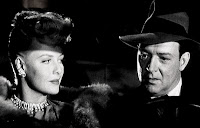 William Gargan is a world-weary cop with a sweet wife and cute son who is trying break off an affair with spoiled rich sexy blonde Janis Carter, who seems to like things a little rough. One night, while parked near a beach, he tries to tell her goodbye, but she gets into a tussle with him which ends in a torrid kiss. However, at the same time, they see a man beat a woman to death with a tire iron in another parked car. He pulls his gun to shoot at the escaping killer, but Carter warns him about the scandal that would erupt if he got involved. When the police investigate, they find Gargan's tire tracks in the sand. Before they can trace the tracks, the cops arrest a man for the murder. Gargan knows they don't have the right man, so he races against time to find the killer on his own. When it turns out that Carter not only knew the dead woman, but may be engaged in a dalliance with a suspect whose prints were found at the scene, things get even stickier for Gargan.
William Gargan is a world-weary cop with a sweet wife and cute son who is trying break off an affair with spoiled rich sexy blonde Janis Carter, who seems to like things a little rough. One night, while parked near a beach, he tries to tell her goodbye, but she gets into a tussle with him which ends in a torrid kiss. However, at the same time, they see a man beat a woman to death with a tire iron in another parked car. He pulls his gun to shoot at the escaping killer, but Carter warns him about the scandal that would erupt if he got involved. When the police investigate, they find Gargan's tire tracks in the sand. Before they can trace the tracks, the cops arrest a man for the murder. Gargan knows they don't have the right man, so he races against time to find the killer on his own. When it turns out that Carter not only knew the dead woman, but may be engaged in a dalliance with a suspect whose prints were found at the scene, things get even stickier for Gargan.This unsung little B-film is a very nice example of film noir, complete with a flawed and conflicted hero (more like an anti-hero for most of the film), a sexy femme fatale, and passion and murder in the night. Gargan is fine as the appropriately hangdog lead; in his attempted breakup scene, he actually gets to say lines like, "This is the end of the line," "You’re just no good for me, baby," and "We both add up to zero." Carter (pictured with Gargan), however, burns up the screen, giving one of the best "bad girl" performances in all of noir. She (the character) is smoking hot and knows it, lording her power over poor Gargan for most of the running time. Only at the climax, which involves an icepick in someone's back, does she falter a bit, and I blame that on the writing. Jeff Donnell is colorless as Gargan's wife. The title comes from a radio show from which this was adapted; the main story is framed as a flashback told by the night editor (Charles D. Brown) of the New York Star to his staff, primarily intended as a cautionary tale aimed at a sweaty and despondent young reporter (Coulter Irwin, who definitely has the sweaty part down). A must-see for noir fans, available on the DVD set Bad Girls of Film Noir, Volume 2. [DVD]














